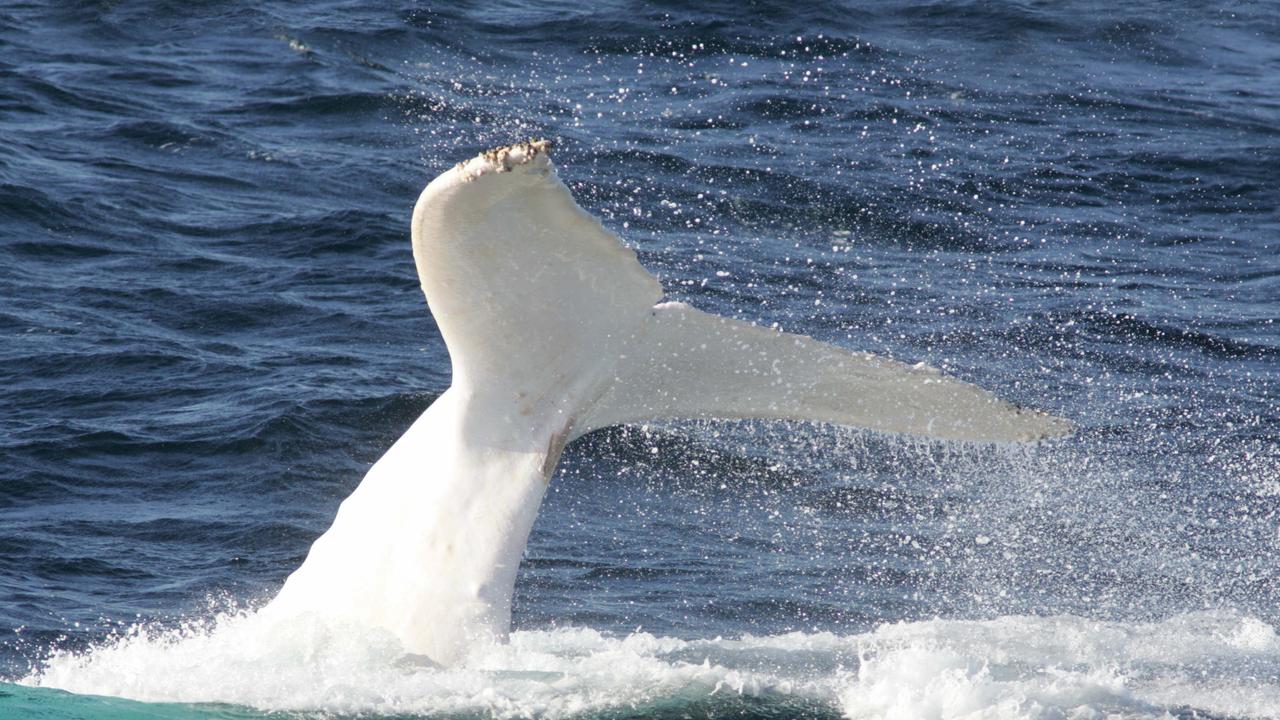Shock theory on fate of Migaloo the celebrity whale
It’s been several years since the last confirmed sighting of the famous albino whale Migaloo and now a disturbing theory has emerged in an explosive new report.
QLD News
Don't miss out on the headlines from QLD News. Followed categories will be added to My News.
Iconic albino whale Migaloo may have been killed by a Queensland shark net according to an explosive environmental report set to be released today.
Commissioned by environmental group The Envoy Foundation, the 2023 review into the Queensland Shark Control Program has delivered a scathing assessment of the polarising policy which aims to protect the state’s beaches from ocean predators.
Among a raft of controversial conclusions, the report claims there is no evidence that the program reduces the risk of shark attacks and calls for the RSPCA to investigate and prosecute alleged breaches of federal environmental legislation by government contractors.
The Envoy Foundation repeated calls for the state’s shark nets to be replaced by drum lines for this year’s annual whale migration, which will start in earnest in early June.
The report also suggests Migaloo’s mysterious absence from the Queensland coastline for the past few years could be due to an encounter with a Sunshine Coast shark net which disappeared in 2021.
■ Migaloo: The making of an Aussie icon

“There have been no sightings of Migaloo since this shark net went missing,” the report said.
“It is plausible that Migaloo was alive and on the Queensland coastline in 2021, and was entangled in this Rainbow Beach shark net overnight on August 20-21.
“Being a large male or ‘bull’ humpback, he would be more than capable of dislodging a shark net and attempting to continue on his migration, or fleeing away from the coast in distress.
“If this plausible situation has transpired, it would be a certain death sentence for him.”
Migaloo has been a popular visitor to Queensland waters over the past two decades, but there is no confirmed sighting of the rock star of the deep since 2020 and his demise would be mourned by nature lovers around the world.
However, there have been occasions where it has been several years between confirming sightings of the majestic sea mammal.
There were fears a white whale carcass on a Victorian beach in 2022 was that of Migaloo, but testing confirmed it was a different animal.

The State government and the department of agriculture and fisheries have long maintained that protecting human life is the priority and repeated that mantra this week after questions were raised over a review into the gruesome killing of a tiger shark by a contractor off a Sunshine Coast beach.
Last year, the program recorded the capture of 959 sharks, up from 753 the previous year and while only two people have been killed and 40 attacked at protected Queensland beaches since the introduction of nets and drum lines in the 1960s, the Envoy Foundation report claims “there is no evidence that the program reduces the risk of shark bite”.
“The low fatality percentage can be explained by fast medical response times (rather than the presence of nets or drum lines),” the report said.
The report also called on the RSPCA to investigate and prosecute allegations of animal cruelty and breaches of relevant environmental legislation.
“We strongly believe there is insufficient monitoring of contractors adherence to protocols … and they are in breach of animal cruelty laws,” the report said.
Envoy Foundation founder Andre Borell said it was time for a serious discussion about ending the shark net program.

“This report highlights the shark control programs’ many failings and shows what it really is – a highly destructive culling program with countless innocent victims, and one that doesn’t even achieve its purpose,” he said.
“The program simply cannot continue as it is, the toll on wildlife is too high, and the benefit to swimmers is non-existent with so many shark bites happening at so-called “protected” beaches.
“It’s time to bring the shark control program into the 21st century.
“Let’s use some of the modern technologies that actually work, like drones and shark barriers. “Queensland is over a decade behind NSW on this, and it’s time to catch up, or better yet, overtake them.
“Images of every entangled humpback, and every dead dolphin, are damaging the Queensland brand.”
Last year, 138 non-shark marine animals were captured by shark nets or drum lines including 28 mammals such as dolphins and whales and 38 sea turtles.
In a statement issued prior to the release of the Envoy Foundation Report, a spokesperson for the department of agriculture and fisheries said “protection of human life will always be the top priority of the shark control program”.
Research and trials are also being conducted into nonlethal measures such as drone technology and personal shark deterrent equipment.




